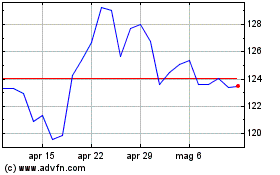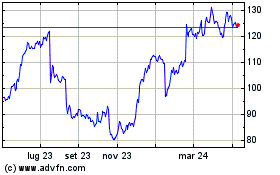Discover® U.S. Spending MonitorSM Falls to New Low
04 Marzo 2009 - 12:00PM
Business Wire
The Discover U.S. Spending Monitor reached an all-time low in
February, falling more than two points to 75.7 (based out of 100).
The decline reflects record-low readings for the Monitor�s two main
components: economic confidence and spending intentions. More than
67 percent of the 13,000 adults surveyed in February gave the
economy a poor rating and for the ninth consecutive month consumers
lowered their spending intentions.
In addition, consumers seem to be socking more money away to
cope with an uncertain economy. February marked the third time in
as many months that there was an increase in the number of
consumers who intend to save the same or more than they did the
previous month.
Consumers Planning to Cut Expenses Across the Board
A Monitor-high 82 percent of consumers in February said they
intend to spend the same or less next month, and 77 percent said
they actually managed to do just that the month before.
Jolted into expense reductions by high energy prices last spring
and summer, a majority of Americans continue to keep a tight rein
on their wallets. This month, though gas prices remained unusually
low at less than $1.70 a gallon, the highest number of consumers
ever, 74 percent, said they expect to be spending the same or less
on household items next month.
In addition, 91 percent of consumers say they will spend the
same or less next month on discretionary items like entertainment.
Likewise, more than 85 percent of the nation�s shoppers intend to
either hold the line or reduce their spending in March for home
improvements and major personal items.
�Until consumers can see some light at the end of the tunnel
concerning the economy, I don�t expect their spending intentions to
change much,ďż˝ said Julie Loeger, senior vice president of brand and
product management for Discover Financial Services. �The economy is
giving them an incentive to save right now which unfortunately is
coming at the expense of the nation�s retailers.�
The Monitor reported for the second month in a row that 57
percent of consumers plan to continue to save and invest the same
or more in the next month. This is the highest this number has been
since October.
Record 81 Percent Have the Same or More Money Left Over Than
Previous Month
While many of the Monitor�s readings reached record lows in
February, there were some underlying bright spots. For the second
consecutive month, only 37 percent expected an added expense or
income shortfall in the next 30 days. This is the lowest this
number has been in a year. Furthermore, while less than a majority
(49 percent) of consumers said they planned on having money left
over after paying bills in February, of those who did have money
left over, a record 81 percent said they expected to have the same
or more money left over than the previous month. This was the first
time this number broke 80 percent since September 2007 and the
third straight month this number has increased.
However, the increase in money left over has not resulted in a
buildup in reserves from consumers should they suddenly lose their
income. Over 43 percent said they can only last a month or less
maintaining their current lifestyle if they suddenly lost their
income. Only 21 percent said they had enough reserves to last six
months or more. This is the lowest this number has been in nearly a
year.
Economic Confidence Hits Monitor Low
The economic confidence component of the Monitor dropped to a
new low in February and now measures a full 10 points lower than it
did in September. Only 6 percent of the consumers surveyed give the
U.S. economy a good or excellent rating and only eight percent
think things are getting better, both new lows.
Meanwhile, even though the government enacted a $789 billion
stimulus package in February, the move could not sway the relative
economic pessimism of consumers, 69 percent of whom continue to
think that the economy is getting worse.
The economic stimulus package did little to change consumersďż˝
opinion about their personal finances either. Just 34 percent rate
their personal finances as good or excellent, a record low and 6
points below what consumers reported last September.
�Any hope of a consumer-driven economic recovery will depend on
the confidence consumers have in their own personal finances,ďż˝ said
Loeger. �And right now, despite the increase in savings many
consumers are reporting over the last three months, that confidence
just isn�t there.�
For more Discover U.S. Spending Monitor survey data, charts and
information, please visit
www.discoverfinancial.com/surveys/spending.shtml.
About Discover U.S. Spending Monitor
The Discoverďż˝ U.S. Spending MonitorSM is a monthly index of
consumer spending intentions and capacity that is based on
interviews with a random sample of 15,000 U.S. adults conducted at
a rate of 500 per night. In addition to spending, the survey asks
consumers their opinions on the U.S. economy and on their personal
finances. Weekly reports reflect calculations for the seven
previous days of interviews, or a sample of 3,500 adults. The
Monitor began in May 2007 with a base index of 100. Surveys are
conducted by Rasmussen Reports, an independent survey research firm
(www.rasmussenreports.com).
About Discover Financial Services
Discover Financial Services (NYSE: DFS) is a leading credit card
issuer and electronic payment services company with one of the most
recognized brands in U.S. financial services. The company operates
the Discover Card, America's cash rewards pioneer. Since its
inception in 1986, the company has become one of the largest card
issuers in the United States. Its payments businesses consist of
the Discover Network, with millions of merchant and cash access
locations; PULSE, one of the nation's leading ATM/debit networks;
and Diners Club International, a global payments network with
acceptance in 185 countries and territories. For more information,
visit www.discoverfinancial.com.
Grafico Azioni Discover Financial Servi... (NYSE:DFS)
Storico
Da Giu 2024 a Lug 2024

Grafico Azioni Discover Financial Servi... (NYSE:DFS)
Storico
Da Lug 2023 a Lug 2024
